Eric Ambler - State of Siege
Здесь есть возможность читать онлайн «Eric Ambler - State of Siege» весь текст электронной книги совершенно бесплатно (целиком полную версию без сокращений). В некоторых случаях можно слушать аудио, скачать через торрент в формате fb2 и присутствует краткое содержание. Год выпуска: 1956, ISBN: 1956, Издательство: Berkley, Жанр: Криминальный детектив, на английском языке. Описание произведения, (предисловие) а так же отзывы посетителей доступны на портале библиотеки ЛибКат.
- Название:State of Siege
- Автор:
- Издательство:Berkley
- Жанр:
- Год:1956
- ISBN:9780425067680
- Рейтинг книги:3 / 5. Голосов: 1
-
Избранное:Добавить в избранное
- Отзывы:
-
Ваша оценка:
- 60
- 1
- 2
- 3
- 4
- 5
State of Siege: краткое содержание, описание и аннотация
Предлагаем к чтению аннотацию, описание, краткое содержание или предисловие (зависит от того, что написал сам автор книги «State of Siege»). Если вы не нашли необходимую информацию о книге — напишите в комментариях, мы постараемся отыскать её.
State of Siege — читать онлайн бесплатно полную книгу (весь текст) целиком
Ниже представлен текст книги, разбитый по страницам. Система сохранения места последней прочитанной страницы, позволяет с удобством читать онлайн бесплатно книгу «State of Siege», без необходимости каждый раз заново искать на чём Вы остановились. Поставьте закладку, и сможете в любой момент перейти на страницу, на которой закончили чтение.
Интервал:
Закладка:
It began with a recital of the “crimes” committed by the Nasjah Government, and then went on to say that, in order to save the nation from the colonialist vultures gathering over its helpless body, the People’s National Freedom Party had taken over the functions of government. The Nasjah gang had run away. Insignificant bands of their adherents, incited by foreign agents, might make isolated attempts to resist the authority of the new government; but these would quickly be eliminated. In the capital, order had been restored and all was calm. However, as a precaution against reactionary elements and to protect life and property, certain temporary security measures had been ordered by General Sanusi, head of the People’s National Freedom Party.
There followed a list of ordinances, amounting in effect to a declaration of martial law, and an intimidating series of instructions to provincial mayors. It was stated finally that, within the next few hours, General Sanusi would himself broadcast a message of hope and encouragement to the loyal people of Sunda from his secret headquarters. Meanwhile, they should stay quietly in their houses. Groups of more than three persons assembling in the streets would be treated as hostile and dealt with accordingly. Admittedly, this was harsh, but if the people were to be protected against the Godless forces of reaction, harshness was necessary. All loyal, right-thinking men would understand the necessity. Through discipline the way lay open to freedom.
The voice stopped. A few seconds later the recognition signal began again.
The sunlight was pouring on to the terrace now. At that time yesterday I had lain half-awake on the spare bed in the living room, trying to ignore the sounds of traffic coming up from the square below. Today, there was scarcely a sound. Now and again a vehicle drove up to the Air Terminal entrance, but apart from that the square was silent. Like a wary animal, the whole city seemed to have gone to ground. Six floors down, in the roadway, a soldier hawked and spat, and the noise interested the soldier on the terrace sufficiently to make him look down over the balustrade.
“Freedom!” said Rosalie sharply. She used the Sundanese word “merkeda” and made it sound like a curse.
She was sitting in the chair behind the drawn curtain, the sunlight casting the pattern of the material across her face. I could not see her eyes, but her hands were gripping the arms of the chair tightly and her whole body was tense.
I shrugged. “All political parties use that word.” I paused, then added: “Why don’t you lie down and try to get some rest?”
She did not answer, and after a moment or two I went over and put my hand on her shoulder. As I touched her, she sobbed and began to cry helplessly. I put my arm round her and waited. When I felt that the worst of it was over, I led her to the bed and made her lie down. Then, I went back to the chair, took my shirt off and wondered what it was she did not like about freedom. In the next room the recognition signal stopped again and the voice began to repeat the earlier announcement.
I was quite sure that she had gone to sleep, but, as the announcement ended, I heard her sigh and looked over at her.
She was watching me.
“There is something I wish to say,” she said.
“Go to sleep. You will feel better.”
She shook her head. “It is about my father. I did not tell you the truth. I said that he died in a Japanese prison camp. That is not true.”
“Is he alive then?”
“No. He died, but not in that way.”
I waited.
For a moment or so she stared at the ceiling, then she went on. “My father was in a camp in Siam. When he came back, we went outside the city to a small place where my father owned a plot of land. We thought that for us it would be safer where there were other Eurasian families, because of the way the pemoedas hated us.”
“Pemoedas?”
“That is what we called the young soldiers of the liberation army. Anyone who was not Sundanese they wanted to kill. When the Amboina troops left, there was nothing to stop them. Even the police were afraid of them, or perhaps they did not care.”
She paused, and then went on slowly. “One day, a lot of them came in trucks. They had guns, and they made everyone in the village leave their houses and stand in the square while they searched the houses. They said that they were looking for hidden arms, but they were really looting. They took everything of value that there was and put it in the trucks. Then, one of them saw my father. Some of the other men in the village had made him stand among them so that he would not be noticed, but this pemoeda saw him and shouted to the others that he had found a Dutchman. The others came running up. Some of them were boys of fifteen or sixteen.” She drew a deep breath. “They took my father, and tied him by the wrists to a hook at the back of one of the trucks. They said that he should stay there until there was nothing left of him but his hands. Then they drove the truck fast up and down the road and round the square in front of us. And while my father was battered to death, the pemoedas clapped and laughed and ran along behind the truck shouting ‘ Merkeda! Merkeda!’ ”
She stopped, still staring up at the ceiling.
“Why did you say that he’d died in a prison camp?” I asked.
“That is something that everybody understands. Sometimes I almost believe it myself. It is easier to think of.”
Her eyes closed. When I went over to her a few minutes later I saw that this time she was really asleep. The voice on the radio in the next room finished the second reading of the announcement and the bamboo xylophone began again.
I needed to go to the bathhouse. I picked up a towel, went to the window and snapped my fingers. The sentry turned quickly and raised his gun.
I explained what I wanted. He said something that I did not catch; but he nodded, too, so I went along the terrace. I had left my shaving things in the bathhouse, and by the time I had finished there, I felt less depressed. I have always sympathised with those legendary Empire-builders who changed for dinner in the jungle. When I came out, I did something which I would not have done when I had gone in. Although the sentry was watching me, I walked over to the balustrade of the terrace and looked down into the square.
There were even more troops there than I had imagined; over a hundred, I thought, split up into squads of about a dozen. Rough barricades had been erected at the four entrances to the square, and the squads manning them either sat on the ground smoking or lounged in nearby doorways. Between the trees on the edge of the gardens, four machine guns had been set up covering the approaches, and parked in the centre under tarpaulins were two anti-tank guns. They looked like old British two-pounders. I had always been given to understand that Sanusi’s army had no artillery of any description. Possibly two-pounders had not been reckoned as artillery; possibly the situation had changed.
The sentry was fidgeting, so I went back to the bedroom, bowing to him politely on the way.
Rosalie was still asleep. I got out some new slacks and a clean shirt and changed into them. Then, I considered another matter.
I had taken a bottle of water into the room the previous night, but most of it was now gone; and the water from the bathhouse main could not safely be drunk without boiling it first. There were bottles of drinking-water in the refrigerator; but that was in the kitchen and therefore inaccessible. And there was the matter of food. With some people fear creates a craving for food; but with most, I think, it has the opposite effect. It has with me. But I knew that, if we survived the next few hours, a moment would come when food would become really necessary. I also knew that when the men murmuring in the next room grew hungry, they would soon eat what was in the refrigerator. It would be as well to see if I could appropriate a little of it, some fruit and eggs, perhaps, before that happened.
Читать дальшеИнтервал:
Закладка:
Похожие книги на «State of Siege»
Представляем Вашему вниманию похожие книги на «State of Siege» списком для выбора. Мы отобрали схожую по названию и смыслу литературу в надежде предоставить читателям больше вариантов отыскать новые, интересные, ещё непрочитанные произведения.
Обсуждение, отзывы о книге «State of Siege» и просто собственные мнения читателей. Оставьте ваши комментарии, напишите, что Вы думаете о произведении, его смысле или главных героях. Укажите что конкретно понравилось, а что нет, и почему Вы так считаете.












